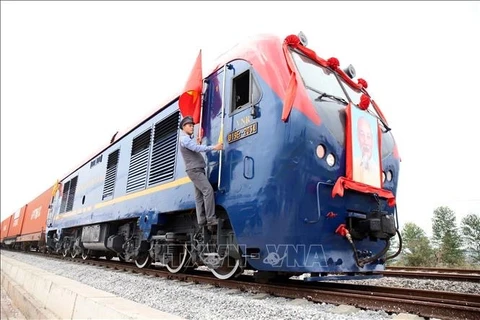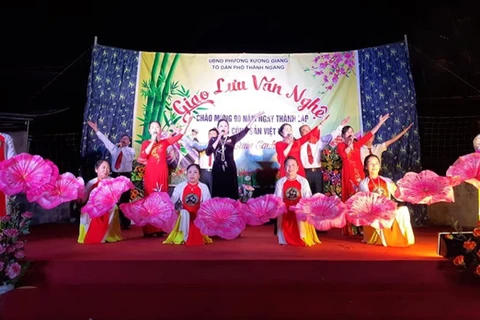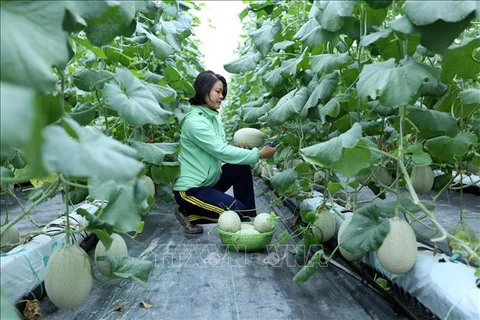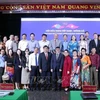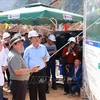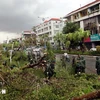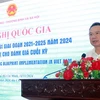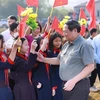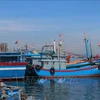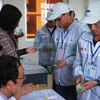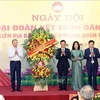Bac Giang (VNA) – Bac Giang will focus on removing obstacles to raise the efficiency in the implementation of the National Target Programme on New-Style Rural Area Building in the northern province.
According to the provincial Department of Agriculture and Rural Development, from now to 2025, Bac Giang will priortise the building of advanced and model new-style rural communes, and model new-style villages to vastly improve the look of its living areas.
The rural building efforts will go in tandem with digital transformation, towards the formation of smart village and commune models, and with tourism development, aiming to raise income of local residents, the department said.
At the same time, the province will step up agricultural restructuring to develop a sector of sustainability, with greater attention to be paid to product quality.
Bac Giang will continue effectively implementing the “One Commune One Product” (OCOP) programme by utilising its major products and potential, and work to improve the performance of cooperatives.
To accelerate the shift of labour structure, the province will push other sectors like industry, services and trade, and implement the three breakthroughs of rural security and order, waste collection and treatment, narrowing the gap in new rural area building between localities.
As of the end of 2022, six out of 10 districts in Bac Giang were recognised as new rural areas that completed their task of building towards that goal. Some 145 out of 182 communes won the status, with 42 satisfying the criteria set for an advanced new rural commune. Quang Minh in Viet Yen district was the first model new-style rural commune in the province. The province counted a total of 239 model new-style villages.
According to the provincial Department of Agriculture and Rural Development, from now to 2025, Bac Giang will priortise the building of advanced and model new-style rural communes, and model new-style villages to vastly improve the look of its living areas.
The rural building efforts will go in tandem with digital transformation, towards the formation of smart village and commune models, and with tourism development, aiming to raise income of local residents, the department said.
At the same time, the province will step up agricultural restructuring to develop a sector of sustainability, with greater attention to be paid to product quality.
Bac Giang will continue effectively implementing the “One Commune One Product” (OCOP) programme by utilising its major products and potential, and work to improve the performance of cooperatives.
To accelerate the shift of labour structure, the province will push other sectors like industry, services and trade, and implement the three breakthroughs of rural security and order, waste collection and treatment, narrowing the gap in new rural area building between localities.
As of the end of 2022, six out of 10 districts in Bac Giang were recognised as new rural areas that completed their task of building towards that goal. Some 145 out of 182 communes won the status, with 42 satisfying the criteria set for an advanced new rural commune. Quang Minh in Viet Yen district was the first model new-style rural commune in the province. The province counted a total of 239 model new-style villages.
Bac Giang plans to earmark more than 1.12 trillion VND (47.41 million USD) for the rural building programme in 2021-2025, with over 735 billion VND for 2021-2023.
It has issued various mechanisms and policies to mobilise resources for the programme.
Apart from capital provided by central and provincial agencies, localities in Bac Giang have also used part of their budget to conduct work to complete the programme, and integrated it into their projects plan.
The new rural area building movement has received a warm response from rural residents who donated more than 35.4 hectares of land, 33,000 working days and more than 38 billion VND to build public facilities.
Since 2021, Bac Giang has upgraded more than 967km of motorways and maintained and upgraded 1,300 irrigation facilities.
All of the 182 communes in the province now have cultural houses, and 86.5% of them have cultural and sport establishments at village and commune levels.
Health facilities have been enhanced, and the quality of primary health care for the rural population has been improved. The number of hospital beds per 10,000 is approaching 31.8, higher than the national average.
Bac Giang will promote the transfer and application of scientific and technological advances in agricultural production, forestry and fisheries, according to the provincial People’s Committee.
The province attaches importance to the application of national and international good agricultural standards such as VietGAP and GlobalGAP, clean technology, biological technology, and organic farming. Bac Giang also attaches importance to food hygiene and safety and environmental protection.
Bac Giang authorities will encourage the building of environmentally-friendly agricultural production models in the direction of organic farming or circular agriculture.
Investment will be focused on key products of the province, with the aim of raising the production value of Bac Giang’s seven key products by an average 5% a year. Production in concentrated farming areas will follow food safety standards; forests will be protected and developed in combination with protecting water resources. The forestry economy will be developed in the direction of both protecting the forest and increasing incomes for locals.
Bac Giang plans to mechanise not only production but also harvesting, post-harvest preserving and processing in order to enhance productivity, and the quality and competitiveness of agricultural products. Attention will be paid to mechanization and automation of all links in the production process of products under the One Commune One Product (OCOP) programme./.
It has issued various mechanisms and policies to mobilise resources for the programme.
Apart from capital provided by central and provincial agencies, localities in Bac Giang have also used part of their budget to conduct work to complete the programme, and integrated it into their projects plan.
The new rural area building movement has received a warm response from rural residents who donated more than 35.4 hectares of land, 33,000 working days and more than 38 billion VND to build public facilities.
Since 2021, Bac Giang has upgraded more than 967km of motorways and maintained and upgraded 1,300 irrigation facilities.
All of the 182 communes in the province now have cultural houses, and 86.5% of them have cultural and sport establishments at village and commune levels.
Health facilities have been enhanced, and the quality of primary health care for the rural population has been improved. The number of hospital beds per 10,000 is approaching 31.8, higher than the national average.
Bac Giang will promote the transfer and application of scientific and technological advances in agricultural production, forestry and fisheries, according to the provincial People’s Committee.
The province attaches importance to the application of national and international good agricultural standards such as VietGAP and GlobalGAP, clean technology, biological technology, and organic farming. Bac Giang also attaches importance to food hygiene and safety and environmental protection.
Bac Giang authorities will encourage the building of environmentally-friendly agricultural production models in the direction of organic farming or circular agriculture.
Investment will be focused on key products of the province, with the aim of raising the production value of Bac Giang’s seven key products by an average 5% a year. Production in concentrated farming areas will follow food safety standards; forests will be protected and developed in combination with protecting water resources. The forestry economy will be developed in the direction of both protecting the forest and increasing incomes for locals.
Bac Giang plans to mechanise not only production but also harvesting, post-harvest preserving and processing in order to enhance productivity, and the quality and competitiveness of agricultural products. Attention will be paid to mechanization and automation of all links in the production process of products under the One Commune One Product (OCOP) programme./.
VNA


